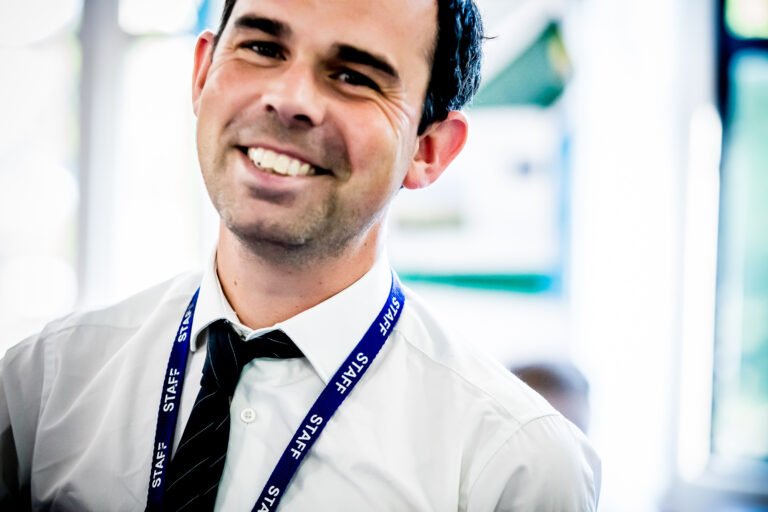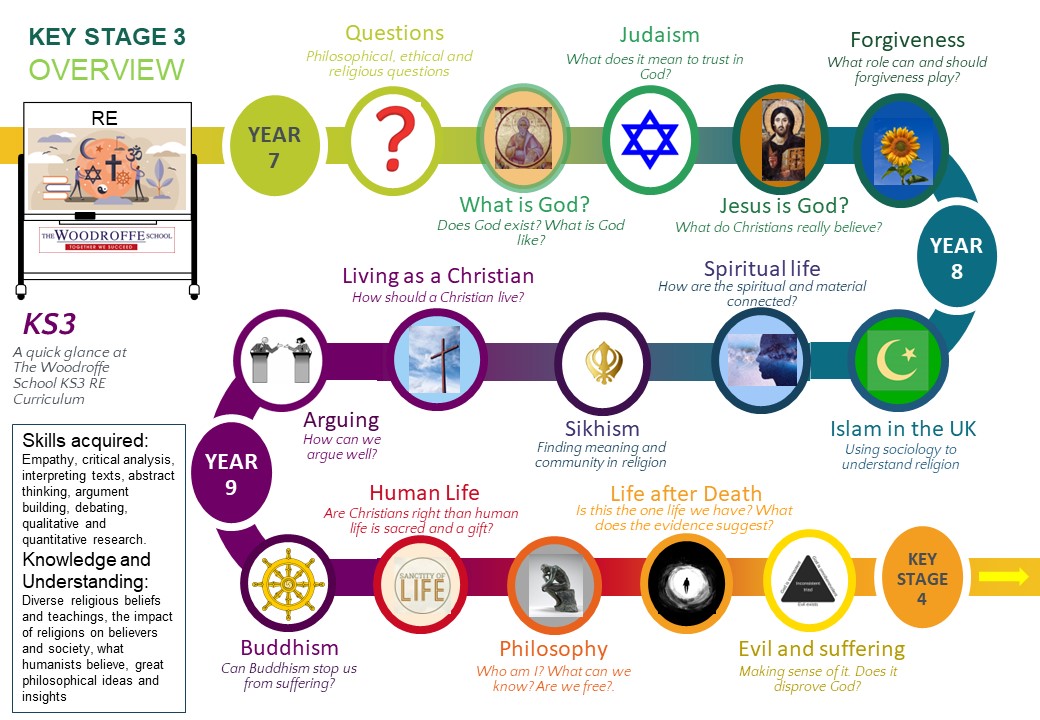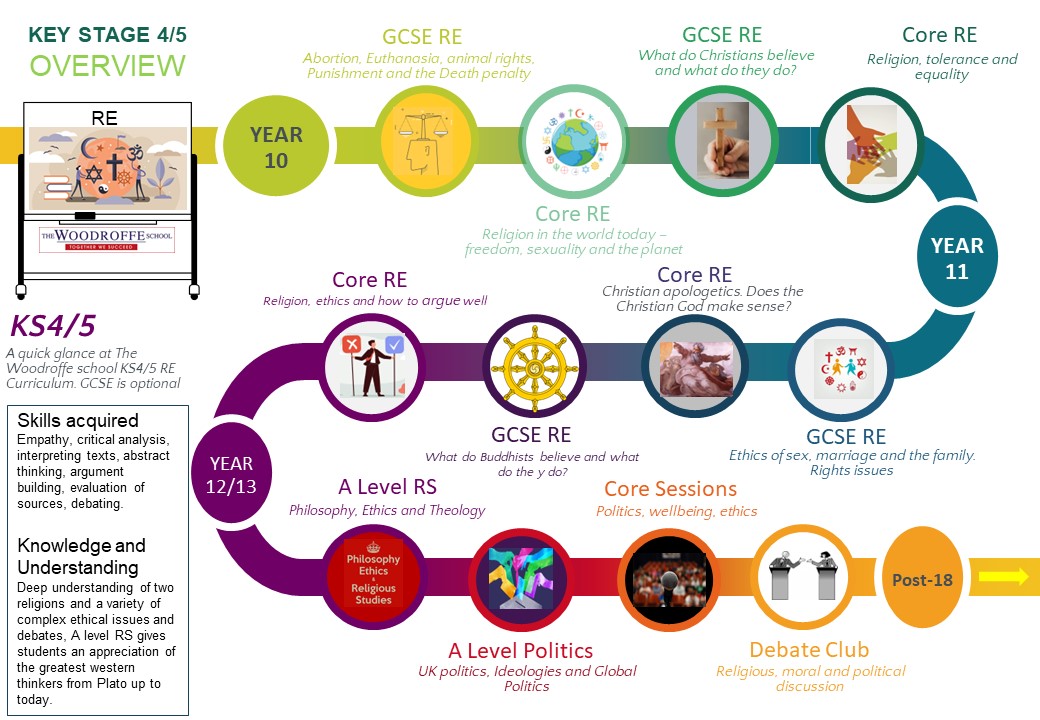Religious Education
The study of religion can help young people understand history, art and morality, and enable them to make sense of the world around them.
RE at Woodroffe aims to help young people learn about a broad range of religions and consider the role of faith in the world and in the lives of so many individuals across the globe.

The study of religion can help young people understand history, art and morality, and enable them to make sense of the world around them. RE at Woodroffe aims to help young people learn about a broad range of religions and consider the role of faith in the world and in the lives of so many individuals across the globe.
There is also another important aim of RE at Woodroffe, and that is to learn how to think. RE challenges students with big questions about human nature, God and morality, and in lessons we aim to help young people apply logic, reason, creativity and empathy to the questions that have always confronted humanity.
The RE curriculum is designed to help pupils to build knowledge, understanding and skills right the way through KS3 and KS4. We intend to enable pupils to identify links between different topics and draw on knowledge gained across their time in RE. We want pupils to be curious students of religion and see the relevance of RE to their lives now and beyond their time with us.
Intent
RE should teach students the substance of religious and non-religious traditions so that they understand believes, practices and the impact of belief on believers and non-believers. Within this, the diversity, complexity and nuances of belief and practice must be addressed and considered so that students understand the reality of the role that religion plays.
RE should also help students learn about ‘ways of knowing’. We want students to develop their scholarship and so we need to give students the tools, skills and experience to explore the content of the curriculum. Students will think about the nature of knowledge and truth, but they will also learn about the ways that religions are studied, interpreted and understood theologically (meaning for believers), philosophically (coherence) and from the perspective of the social sciences (impact on individual and their communities).
RE should also allow students to develop their ‘personal knowledge’. Engaging with questions raised by religions and belief, including questions about meaning and purpose in life, beliefs about God, ultimate reality, issues of right and wrong and what it means to be human, provide many opportunities for students to develop their ‘position’. Good RE contributes much to the social, moral, spiritual and cultural development of young people and we want to introduce them to ideas, concepts, stories and values that make them think.
These three types of knowledge are identified in the 2021 Ofsted Research Review as what pupils need to learn to be considered successful RE students. We want pupils to be curious students of religion and see the relevance of RE to their lives now and beyond their time with us.
Implementation
The RE curriculum is designed to have a strong sense of continuity. This helps to more effectively develop skills and the three types of knowledge, but also helps to produce a cohesive curriculum where links between topics are more explicit and there is an expectation that students should draw on knowledge gained across their time in RE. The curriculum does not attempt to teach the content of all religions as this does not necessarily result in students getting better at RE. Neither does it sacrifice depth and detail by focussing solely on a series of generic themes. Instead, topics are carefully selected to allow for a balance between depth and breadth and they are positioned in the curriculum to allow pupils to develop knowledge, skills and the conceptual framework to make sense of religion. There is a deliberate effort to blend units that enable deep understanding of a particular religion with units that focus on concepts or ‘big ideas’ that allow for nuanced consideration of overlap between traditions and opportunities to bring learning together.
The interconnectedness of the topics in the curriculum is complex and we should look to pursue and analyse links whenever we encounter them. However, in the interests of planning for a curriculum that deliberately and purposefully deepens and broadens students’ understanding, the KS3 curriculum could be seen to be based on the following rough concepts:
- Yr7: Beliefs and concepts. What is God? How are big questions answered in the western tradition?
- Yr8: Actions, expressions and experience. What is religion? How do religions help structure and anchor a life and enable people find meaning and purpose in life?
- Yr9: Making sense of our existence. What are we? How has religion and philosophy contributed to our understanding of what it is to be human?
There is a sense in which the units in each year build on what has come before and we want to review and revisit ideas, concepts and beliefs with students to make the connections explicit and to enable them to see the links. The use of booklets and questions to frame learning runs throughout and should add continuity and coherence to the experience of students.
Impact
- Students will know more and be able to respond in informed, intelligent and reflective ways. Lessons will be enquiries that fill buckets and light fires.
- Students will not see religion as a series of unconnected and static bodies of knowledge, but as an aspect of human existence that is diverse, ever-changing and ‘live’.
- Students will become better at constructing arguments through a clear and consistent assessment system that requires students to use knowledge from across the curriculum.
Notes on intent, implementation and impact of KS4 Core RE
Year 10 have 12 lessons of RE split over two parts of the year. Year 11 have 8 lessons split over two parts of the year.
The aim of core RE is to ask pupils to use their knowledge from KS3 to help them explore the role and expression of religious belief in the UK and beyond. We want young people to see the importance of being informed about religious and non-religious traditions and, as always, we want the complexity and diversity of religious traditions to be apparent to students (e.g. when looking at gender and homosexuality). We also want core RE to contribute to students’ personal development and give them experience of the ways that dilemmas and problems can be navigated with the help of a thoughtful and curious approach.
Some of the big ‘battering rams’ that are frequently used against religion today (e.g. teachings on homosexuality, treatment of women and the superiority of science) are carefully considered alongside arguments and testimony from a variety of religious people to help students see these issues in a more nuanced way. This will hopefully give students the experience and conceptual framework with which to address questions of religion which will surely continue to be raised in the future.
Previous learning on the substance of Christian beliefs should help give a grounding to the debates and arguments that are raised here, and the focus on ethics and ideas about equality that are a part of many of the aspects of the KS3 curriculum will also help students engage with the issues raised in the lessons.
The Year 11 unit on Christian apologetics is designed in light of work done by Catholics in America who identified four misconceptions about belief in God and suggested that these prevented young people from taking religion seriously. These topics are addressed in different places in KS3, but are gathered together here so that year 11s can engage in the debates having extensively studied science and religion.
Year 7
We begin with a unit that aims to develop thinking and discussion skills through the use of big questions. Pupils then undertake a short course on the philosophy of religion where they will examine a range of beliefs about what is meant by the word ‘God’. The key tenants of Humanism will also be introduced and explored through the study of some ethical issues.
The main aim of year 7 RE is to ensure that pupils are familiar with the key beliefs and concepts of Judaism and Christianity. Central stories and teachings are examined and evaluated in detail to help develop a deeper insight into what it means to be Jewish or Christian today. Pupils will then consider what religions teach about forgiveness and apply this to the true story of Simon Wiesenthal, a victim of the Holocaust who was asked to forgive.
Year 8
We build on the knowledge and understanding gained in year 7 and examine the way that religious people express their faith and how action can be inspired by religious belief. Understanding of different religions is developed by units that use Islam and Sikhism to look to answer questions about what really makes a person religious. We’ll also study different religious and non-religious attitudes towards being spiritual and learn about pilgrimages as a way of exploring the link between the physical world and spirituality.
Pupils will also have the opportunity to extend and deepen their understanding of Christianity with the focus shifting onto an evaluation of the message of Jesus and different interpretations of what He represents to Christians today.
Year 9
The focus moves on to engaging in ever deeper and more philosophical considerations of the nature of human life and religion’s role in making sense of the world around us. We begin with a thorough study of Buddhism. Pupils explore the questions that the Buddha sought to answer and evaluate the usefulness of his teachings.
Philosophy and ethics is the next big focus, with pupils being challenged with the biggest questions in philosophy, such as, ‘am I free?’, ‘how do I know what is real?’ and ‘am I the same person as I was yesterday?’. We will consider whether these ancient problems can help shed any light on our experience of existence today. This is followed by a vigorous debate about how we know what is right and what is wrong, which also provides pupils the opportunity to further deepen their understanding of Christianity by considering different Christian approaches to ethical dilemmas.
Pupils then move on to examine religious and non-religious explanations for evil and suffering, and compare religious beliefs about what happens after we die.
The AQA GCSE course addresses challenging questions about the ultimate meaning and purpose of life, the origins and teachings of religions and the nature of reality. Two religions are studied in depth and a range of philosophical and ethical issues are examined and debated.
Over the two years, pupils will study the following topics:
- Christian theology: What is God?
We’ll use key texts and works of art to critically examine the key concepts and mysteries that make up Christianity. Where do these ideas and beliefs about God come from? - Life: Is human life particularly important?
Examining the debates about abortion, euthanasia and animal rights. What is a person? When does life begin? The work of the Philosopher Peter Singer will be examined in detail. - Buddhist philosophy: What is existence?
A study of the philosophical teachings of the Buddha. - Philosophical arguments for God’s existence: Is God possible?
A critical look at the key arguments for and against God. The work of some of the greatest philosophers, Christian thinkers and atheist writers are analysed in detail. - Christian practices: How should a Christian live and act in the world?
Students will come to a reasoned understanding of how Christian theology and belief is put into practice. - Peace and Conflict: Is war immoral?
A detailed look at the ethics of war. We will compare and contrast different ethical views on the use of violence and apply them to modern examples of war and terrorism. - Buddhist ethics: How do we create a skilful mind that causes no harm?
Understand the value that Buddhists put on wisdom, compassion and meditation. How do individuals perfect themselves? A guest speaker will give us insight into living as a Buddhist. - Crime and Punishment: What is good and bad?
How and why do we punish people? Where do the concepts of ‘good’ and ‘evil’ come from? We will examine in detail the arguments for and against the use of the death penalty.
The course encourages clear, analytical thinking and teaches students to spot flaws in arguments and express themselves in an articulate and persuasive manner.
Government & Politics
The department runs a Government and Politics A level which aims to stimulate and develop an interest in and understanding of Politics both in and outside of the UK, and of core political ideologies.
In studying the political system in the UK, students will learn about the constitution, how Parliament works, the powers of the Prime Minister, how elections are run and what different political parties stand for. They will examine how each of us is affected by what politicians do, and how we can all be a part of the democratic process.
There will also be the opportunity to look at how political systems work elsewhere, such as in the United States, and to compare the British experience with others in an increasingly globalised world.
In studying political ideas, students will investigate the core ideologies of Liberalism, Conservatism and Socialism, as well as having the opportunity to examine issues such as nationalism, feminism and multiculturalism.
Religious Studies
The course explores fundamental questions addressed by philosophers and religious traditions about the nature and origins of human existence. The work of important religious and non-religious thinkers is analysed, religious traditions are carefully examined and the main theories of ethics are introduced and evaluated using examples of modern ethical dilemmas. The RS course encourages clear, analytical thinking and teaches students to spot flaws in arguments and express themselves in an articulate and persuasive manner. These skills are valued in all areas of work, but are especially valuable in law, journalism, education, human resources and management. The subject combines very well with both other humanities subjects and the sciences, and is highly regarded by universities
There course is split into three units:
Unit 1 – Philosophy of Religion. Pupils will study ancient philosophers and a broad range of more recent thinkers to help answer fundamental questions about the nature of reality, the purpose of life and the existence of God.
Unit 2 – Religion and Ethics. Pupils critically assess a wide variety of ethical theories that attempt to tell us what is ‘good’ and then apply them to contemporary ethical issues such as euthanasia and the conduct of businesses and organisations to help assess their validity and usefulness.
Unit 3 – Developments in Religious Thought. Key texts are closely analysed to draw out the important aspects of a religion. Different theological interpretations will be debated. We will examine the way that religions have responded to changes in our society. For example, we will analyse the ways in which religions have adapted to changing views of gender.


